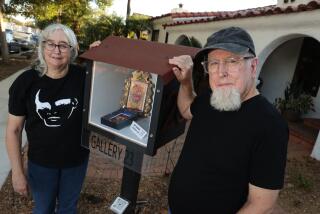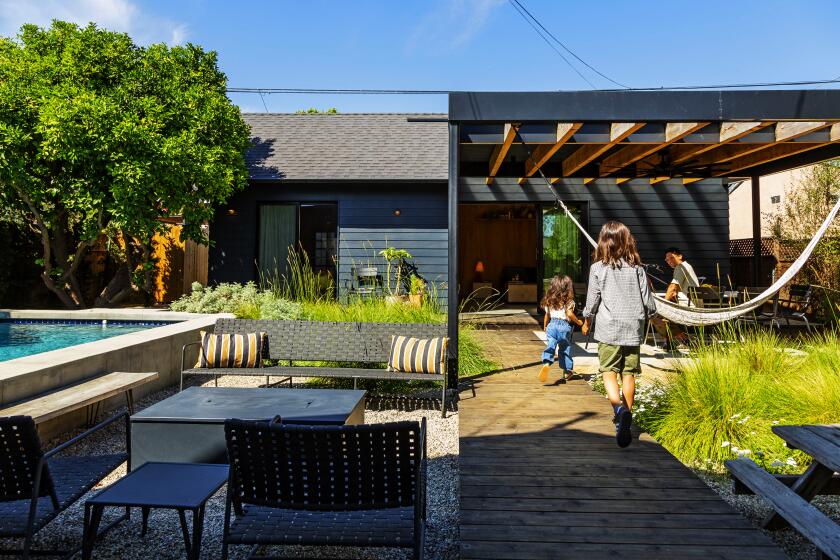NoHo Art Houses Chafe at No! No! From City
- Share via
NORTH HOLLYWOOD — Colorful, rectangular banners strung from lampposts proclaim that this shopworn stretch of North Hollywood is officially designated an arts district. Where now, auto parts stores and thrift shops abound, the seeds will be planted so that an arts community can flourish.
But as urban planners begin crafting a five-year master plan for the district, owners of some of the performance spaces--small cabarets, art galleries and theaters--complain that the greatest drama so far has not been trying to woo ticket-buying patrons, but conquering what they see as a bureaucratic maze at Los Angeles City Hall.
They complain of an expensive and confusing permitting system that they say was designed for businesses much larger, and more prosperous, than theirs. And they wonder--once you get beyond the catchy NoHo name and brightly-hued adornments--what, exactly, does the “arts district” designation mean.
It does not mean, as the owner of one blues/jazz establishment discovered the hard way, that you can offer music and serve refreshments--beer, wine, coffee, soda--without the proper licenses, permits and zoning variances. And it does not mean that you can ignore stringent parking requirements, even if your venue holds only a few dozen people.
Spurred in part by a police raid that shuttered the blues/jazz “art house,” the NoHo Business Owners’ Group has sent a letter to City Council President John Ferraro, whose district includes the Bohemian corridor, asking that he “kindly help us define a more realistic working ground for our artists in NoHo.”
Without some give from the city, many say, it may be curtains for some of the smaller establishments now struggling to survive.
“The city has really stopped forward progress in this area just by some of their regulations,” said David Cox, artistic director of the NoHo-based American Renegade Theatre Company. Cox is one of the founders of the district, which got its official designation in 1994 and is centered near Lankershim and Magnolia boulevards.
“They’re always passing laws that are making it harder and harder for small theaters to exist. And it’s just not conducive to having an arts district.”
Theresa Garcia Newham can tell you firsthand how hard it is to get a “performing arts house” started.
Fiercely devoted to spreading the word about the West Coast style of blues, Newham opened a cramped, 49-seat venue where an eclectic mix of musicians, opera singers and even lovers of poetry could come and perform their art, without pay. She would offer something to drink and accept donations, both for the artists and the quaffables.
But in April, a scant two months after Newham opened Moonglow Emporium for the Arts on Magnolia Boulevard, the Los Angeles Police Department shut her down.
Acting on a complaint, the department moved in. After some argument over whether it was a “bar” or “art house,” the police served up a round of citations for the house. Newham, who owns the business with a friend, was cited for selling alcohol without a license. Her husband was cited for operating without a cafe/entertainment or show permit. In addition, the landlord was ordered to cease the “illegal use or occupancy” of the tiny former storefront, a citation that carries a $400 fee.
*
Newham, who has paid $514 to get the cafe license and is trying to get the other needed permits, said she relied on bad advice and past precedent when she opened her establishment without the proper licenses.
“I personally have seen three other places in the North Hollywood Arts District doing this,” said Newham, adding that one theater owner told her he had been serving wine without the proper permits and accepting donations for years.
Anna McWillie, editor of the monthly NoHo News, which covers the arts scene in the district, agreed that it’s “sort of common practice that theaters, when they have an opening, they’ll serve wine for donations.”
“She’s not the only one that’s doing this. I would say 20% of them, theaters, serve wine for donations,” said McWillie.
Several theater owners said they have since been warned by Los Angeles police to end the practice.
Even nearby theater owners who feel that Newham “did everything wrong,” and was “asking to be caught,” agree with her point that the city should have put more thought into how the tiny, cash-strapped venues would fit into the existing permit and licensing structure.
“They started this district with no definition of what an arts district is,” complained Newham.
“I know that we should have the permits. I’m not saying that we shouldn’t. But we need definitions. If this is an arts district, define what an arts house is. We are not a bar.
“I’m not equipped to be a restaurant, nor do I want to be a restaurant.”
But according to David Keim, a spokesman for the Department of Building and Safety, under existing city regulations Newham’s establishment would classify as either a cabaret or restaurant. Laws have not been changed to account for an “art house.”
*
The arts district designation does allow artists to live in their work space without seeking special zoning variances. Also, a “commercial arts craft” zoning overlay designation allows certain types of arts-related businesses to come into the district, without a zoning change.
And though there apparently has been no relaxation of regulations governing things like dining tables on the sidewalk, the city appears to have addressed one vexing issue: parking.
Officials from the Department of City Planning said that the zoning overlay allows less restrictive parking requirements for buildings built before 1994--which would apply to many structures in the district.
How the regulation affects each venue varies, but the majority of theater and art gallery owners cited expensive parking requirements as one of the many reasons they don’t have the proper permits.
The director of one small NoHo theater said he’s been operating for years without a valid theater permit because he could never meet parking requirements. He estimates that “many, many” theaters in the district are likewise skirting the law, because, they say, they can’t afford the price tag of legality.
“There’s not enough money in opening up a little theater . . . to put $100,000 into the theater to bring it up to code,” said the theater manager, who asked not to be identified.
Keim, of the building department, understands the owners’ frustration, but insists that the laws are aimed at protecting the public.
“I think the laws are well- founded,” said Keim. “And though it sounds like a lot of bureaucracy, it’s really for the safety of those occupants so we don’t have a tragedy where large numbers of people are trying to get out.”
The owners all agreed that some regulations are required to ensure public safety. But they question whether the current regulations and enforcement amount to overkill.
To get the city to address some of their concerns, a group of arts district business owners has appealed for help from Ferraro.
A May 17 letter to Ferraro from the president of the Universal City-North Hollywood Chamber of Commerce and the chair of that group’s NoHo Business Owners’ Group states that “there is confusion with city ordinances that seem quite restrictive to our theater and arts establishments, often proving counterproductive to our efforts to develop the district.”
Alice San Andres-Calleja, who chairs the business group, feels that the city is “trying to apply laws that don’t apply to us,” like the restrictions on serving food and drinks in theaters.
*
A spokesman for Ferraro said the office did not receive the letter, but said the councilman’s field office works with individuals in the district “all the time to encourage the establishment of more businesses there.”
Other city officials noted that the state governs alcohol licenses and the federal government requires handicapped access (another concern of some business owners).
Mikel Pippi, who was hired by the Community Redevelopment Agency to help create a vision for the district, in the form of a master plan, is trying to get the varied groups within the district to come together, map out their concerns and approach City Hall with a unified voice.
“It’s not up to the city to say what the district is, to say ‘this district stands for diversity or for theater,’ ” said Pippi, whose contract with the CRA ends in August. “The people within the district have to come together, form a vision and speak to the government about what they want.
“We have an opportunity to create something world class if they think out of the box,” he added. “But now, to me, the North Hollywood district is a district in search of itself.”
Valley @ Work runs each Tuesday. Karen Robinson-Jacobs can be reached at Karen.R[email protected].
More to Read
The biggest entertainment stories
Get our big stories about Hollywood, film, television, music, arts, culture and more right in your inbox as soon as they publish.
You may occasionally receive promotional content from the Los Angeles Times.










